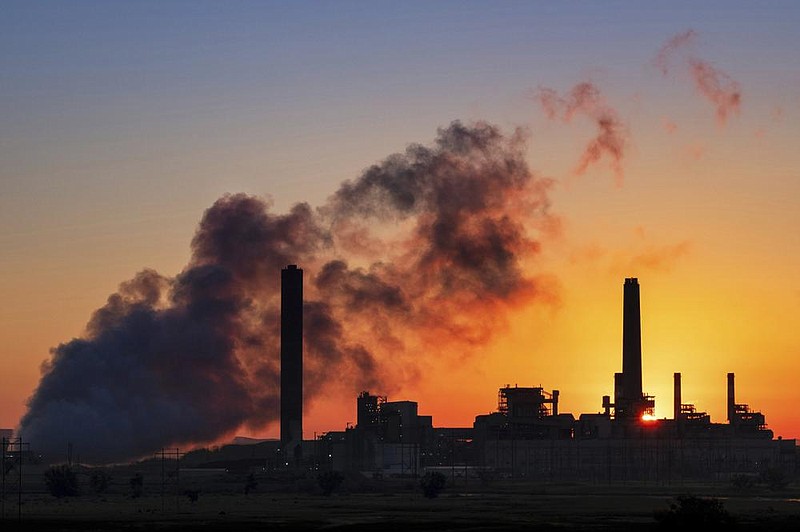WASHINGTON -- A federal appeals court Tuesday struck down the Trump administration's plan to relax restrictions on greenhouse gas emissions from power plants, paving the way for President-elect Joe Biden to enact new and stronger restrictions on power plants.
The U.S. Court of Appeals for the District of Columbia called the Trump administration's Affordable Clean Energy rule a "fundamental misconstruction" of the nation's environmental laws, devised through a "tortured series of misreadings" of legal statute.
On the final full day of the Trump presidency, it effectively ended the Environmental Protection Agency's efforts to weaken and undermine climate change policies and capped a string of setbacks in which courts threw out one deregulation after another. Experts have widely described the EPA's streak as one of the worst legal records of the agency in modern history.
EPA spokeswoman Molly Block called the agency's handling of the rule change "well-supported." The court decision "risks injecting more uncertainty at a time when the nation needs regulatory stability," she said.
Environmental groups celebrated the ruling by a three-member panel of the Court of Appeals.
"Today's decision is the perfect Inauguration Day present for America," said Ben Levitan, a lawyer for the Environmental Defense Fund, one of the groups that had challenged the Trump rule in court.
The appeals court did not reinstate a 2015 regulation that President Barack Obama's EPA had enacted, which would have forced utilities to move away from coal and toward renewable energy to reduce emissions. But it rejected the Trump administration's attempt to repeal and replace that rule with a toothless one.
Judges eviscerated the Trump administration's core argument: that the only possible way to interpret the Clean Air Act of 1970 is that the federal government does not have the authority to set national restrictions on emissions or force states to move away from fossil fuel power. That argument would have prevented Biden or any future administration from tackling climate change from power plants without an explicit new law from Congress.
The Trump administration, the judges said, "may not shirk its responsibility by imagining new limitations that the plain language of the statute does not clearly require."
A core promise of the Biden campaign was to eliminate fossil fuel emissions from the power sector by 2035. With Tuesday's ruling, the Biden administration will not have to wait for the legal fight over the Trump rule to play out before deciding whether or how to use regulation to tackle climate change, said Jody Freeman, a professor of environmental law at Harvard University who served as an adviser to Barack Obama's administration. Instead, she said, the Biden EPA can "go on the offense" immediately.
"The real win here is that the Trump administration failed to tie the Biden team's hands," Freeman said. "They wanted to lock in a narrow legal interpretation and make it impossible for a new administration to set ambitious standards for power plants. That was their whole strategy. And it went down to spectacular defeat."
CLEAN POWER PLAN
In 2015 the Obama administration enacted the Clean Power Plan, which aimed to cut emissions from the power sector 32% by 2030 compared with 2005 levels. To do so, it instructed every state to draft plans to eliminate carbon emissions from power plants by phasing out coal and increasing the generation of renewable energy.
The measure never went into effect. The Supreme Court in 2016 said states did not have to comply until a barrage of lawsuits from conservative states and the coal industry had been resolved. Shortly after the election of President Donald Trump, his EPA repealed the Clean Power Plan.
Andrew Wheeler, the departing administrator of the EPA and a former coal lobbyist, replaced the plan with the weaker Affordable Clean Energy rule, which maintained that the law allows the agency only to set guidelines to reduce emissions at individual power plants with actions like increasing efficiency or upgrading boilers that do not threaten an entire power sector, such as coal.
Alex Flint, executive director of the Alliance for Market Solutions, a conservative group that advocates for a carbon tax, said the ruling created "a mess" for the owners of power plants, steel mills, concrete kilns and other polluting industries.
'IMPOSSIBLE' TO SET PLANS
"One administration pushes rules in one direction, and the next pushes them in the other. Then, a court throws out the rules. It is impossible to make efficient long-term decisions," he said.
He called for Congress to put a price on emissions "so that polluters can decide whether to continue operations and pay the cost of doing so or change their operations."
Freeman said the administration could attempt some last-minute filings in the next 24 hours but saw its chances of success as very low.
Whether Biden will seek to again use regulation to curb power plant emissions is still being debated. Tuesday's ruling, legal experts said, did not give him approval to do so, but it did give him the leeway to try. Any new effort would certainly be challenged by conservatives and would likely face an uncertain future before the Supreme Court.
A spokesman for the Biden transition team did not immediately respond to a request for comment.
Information for this article was contributed by Lisa Friedman of The New York Times; and by Matthew Daly and Ellen Knickmeyer of The Associated Press.
